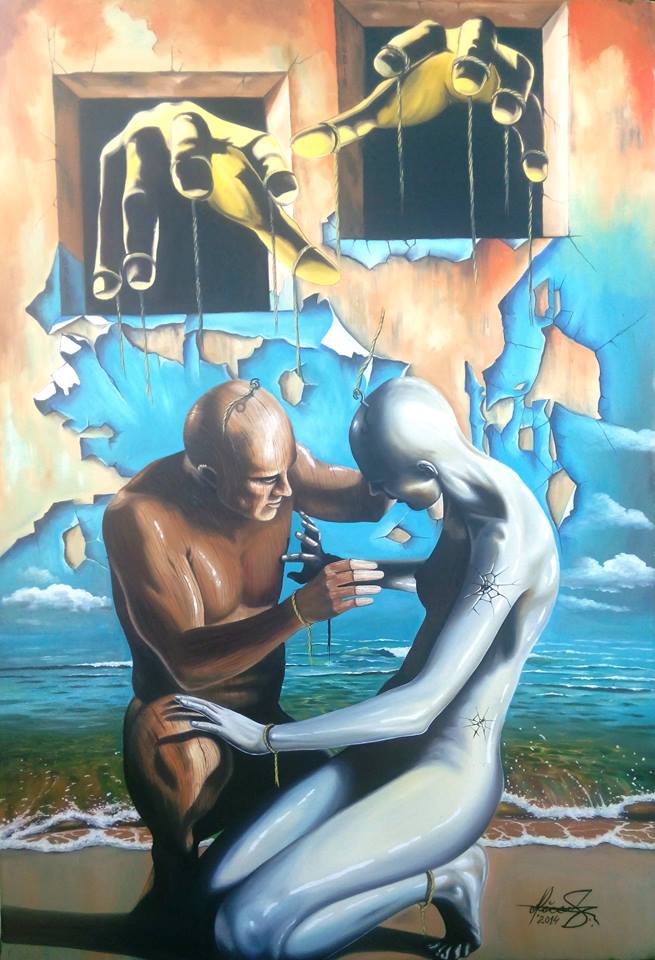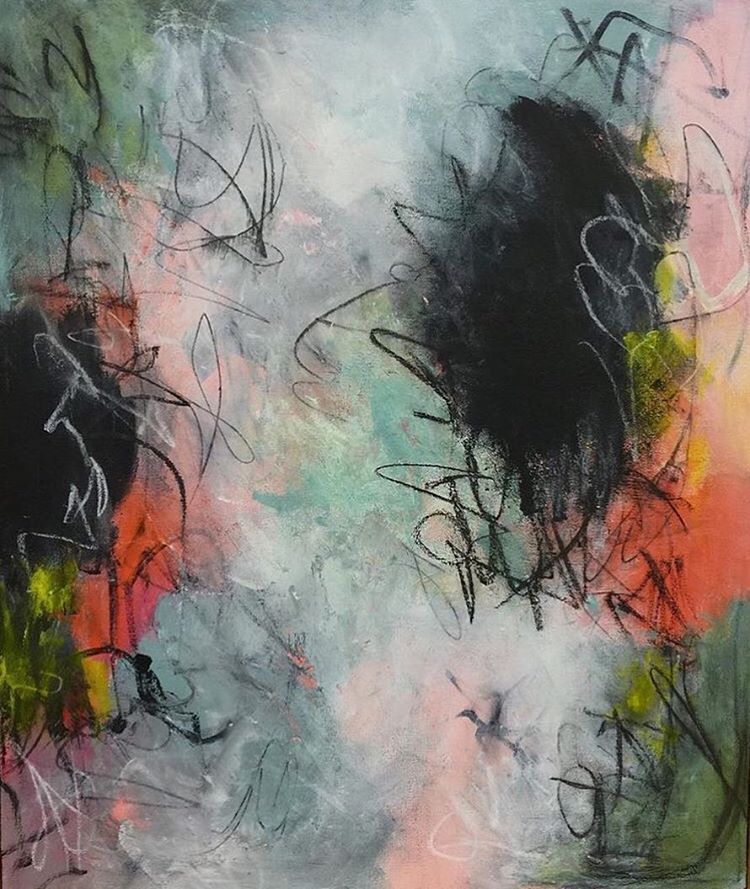by: Drema Deòraich ((Header art by George Grosz.))
“His grin shadowed me, a happy reminder of fleeting insight.” A man, footloose and entirely liberated, offers his ability to get others to open their heart, and eventually their mind, to the struggles of humankind…

I first saw him dancing outside the diner.
Elbows out, coat flapping in the winter wind, arms wide in invitation, his dazzling smile lit up the night. Shoppers on the busy avenue flowed around his gyrations like leaves skirting a whirlpool’s suction, diverted from their paths the bare minimum required to avoid eye contact or, heaven forbid, conversation with a lunatic. Dancing Man never noticed. His exuberance repelled the sting of apathy.
I glanced at the sidewalk near his self-appointed post. No hat awaited donations. He didn’t speak. This was no beggar, but a man in love with life, his joy an offering to those around him.
Something about his complete abandon made me happy. “I’m gonna dance with him when we leave,” I told Bob.
My husband smiled and chewed his salad. “Of course you are,” his expression said.
In such an artsy neighborhood, I shouldn’t have been surprised by Dancing Man’s performance. Diners, health food establishments and family-owned businesses served regular customers seven days a week, while trendy bars spilled light over passing clientele into the wee hours. The local theater marquee displayed film titles like “Not Your Negro,” “Food, Inc.” and “Freedom to Marry.” Renovated brownstones rubbed shoulders in the blocks behind, residents eschewing cars, hoofing it to the nearby organic grocery.
I watched through the window while Bob finished his ginger ale. Afterward, as we strolled to our car, we crossed at the corner and Dancing Man turned toward me, arms outstretched. I danced forward, smiling from ear to ear.
His grin withered. His feet stalled. In a heartbeat he was just Man, mumbling unintelligible words at the ground as we passed.
Bewildered, I stopped dancing and nodded instead. “How ya doin’?”
“I could use a beer.”
“So could I,” I laughed. “Do you want this salad?” I held out my leftovers.
Man flinched from the foam box like it had teeth. “No. Thanks.” He dug in his pocket, pulled forth a dime, a chewing gum wrapper, lint. “Egg Rolls.”
I shook my head. “I don’t have any egg rolls. I only have salad.” I extended the box once more.
“I sure could use some egg rolls.”
“I’ve already eaten, sorry.” I shrugged. “You’re positive you don’t want this?”
He drew back, into himself. “Naw. You have a good evenin’, y’hear?”
“You, too,” I said.
Bob waited a couple steps ahead, patient as Job. We drove away, yet Dancing Man followed me the rest of the night. I saw again that brilliant white smile gleaming from his euphoric brown face, how he’d broken off when I approached him. It wasn’t until I was chasing sleep that I realized my half-eaten handout was an insult, sloppy seconds to a person possessed by hunger. Dreams finally descended upon me in which a blissful man danced, one hand beckoning and the other over his heart.
Dancing Man inhabited my thoughts the next day while I pondered my own agitation.
I’ve been panhandled numerous times. Beside the pancake house. In a Walmart parking lot. In front of the community center not far from Dancing Man’s corner. On occasion, I give them money, like the brave fiddler I tipped for playing with heart and soul in the median during holiday traffic. A young artist once solicited me with his sketchpad, trading portraiture for a few dollars. My smallest bill happened to be a $20. Young Artist left happy. Other times I decline. A thirty-something male in stylish new clothes with bright red high tops hit me up outside the drugstore, begging coin for food. I said I had no cash. It was true, but I wouldn’t have given him a dime anyway. He looked both well-fed and well-dressed. Inside, I bought him crackers and a can of potted meat. When I departed ten minutes later, he was gone.
Our city isn’t the world’s — or even the state’s — largest. Still, I’ve seen blankets or an odd pillow tucked beneath an overpass here. Exploring a small park last summer, Bob and I wandered under a bridge. Intrigued, we pushed on until we saw clear signs of habitation. No humans, only bedrolls and what appeared (from our position) to be a camp stove. Further intrusion felt disrespectful, so we turned away.
These memories danced alongside the fresh tenant in my mind. I asked myself why hadn’t I taken five minutes to buy Man some damn egg rolls. It seemed such a small request for a joyous, dancing spirit on a cold night! I had the means. Instead, I’d shoved my scraps in his face and dismissed him as all the other passersby had before me.
I was no better than they.
Several days lapsed before I posted about my encounter on social media. I described the meeting. I explained how I felt after. I vowed to go back, give Dancing Man those eggrolls and thank him for being my teacher. Reactions from friends and family were no help. A few said I was an inspiration (as if I’d completed some difficult challenge worthy of recognition, rather than simply acknowledged in retrospect another human being’s inherent dignity). More conservative contacts chided my proposed actions. What was he doing begging anyway? He should get a job. Pay his own way. Supporting vagrants only served to exacerbate the issue. He should’ve been damn happy to have the salad. Many asked questions. How was that an affront to him, or a learning experience for me? What did he do to teach me anything? Why would I feed a bum? Still others waved warning flags. Watch those people. They’ll rob you blind. Be careful! Don’t go alone — take Bob along!
Bob (who isn’t alone in this) says I’m too trusting, so perhaps cautionary advice was warranted overall. The rest made me scratch my head. I wasn’t seeking praise. I had no answers for the questions or censure — words could never convey the revelation that clicked home in my head that night so I didn’t even try.
It never occurred to me to wonder how he landed on that corner. I’m sure he has a story. Everyone does. Some end badly, but Dancing Man didn’t look sad. Or maybe he was, and dancing lifted his mood. His grin shadowed me, a happy reminder of fleeting insight. After our initial encounter, a little bit of him lived in every homeless person I saw.
I drove through Dancing Man’s turf every Tuesday. I soon began parking blocks away to walk to my regular appointment so opportunity might arrange a reunion. Weeks passed but still I didn’t see him. Life dizzied me with schedules and classes and career responsibilities. Then, one day, Man was there — not dancing, just standing in the late afternoon sunshine. No headphones. No boom box, though I couldn’t recall seeing one before, either. My footsteps slowed. Was it him? I tried to remember. Last time we’d met, those brown features rose, disguised in chiaroscuro, from a darkling scene. His grin, on the other hand, that looked familiar. I thought it may be the same baggy green army coat.
I said “hello,” and “do you dance on this street?”
He cackled. “Yes, ma’am, sometimes I do. Sometimes I do.” His arms swung back and forth in genial definition of personal space, hands slapping together each time they met.
We chatted about everything and nothing, his ebullience infecting my own mood. I had no doubt his was an interesting tale. Nevertheless, I stuck to inanities. When I set off for my appointment, Man leaned closer to impart a great secret.
“People tell me I look like Eddie Murphy.” He returned to his original upright position, grinning, clapping, almost dancing from one foot to the other.
“Really?” I asked. “Show me your best Eddie Murphy face.”
His features stretched into comic proportions, brows arching over eyes white and wide, lips puckered by just the slightest sneer. Man’s features froze in mimicry until my amusement echoed from nearby buildings, then resumed its toothy smile.
“That’s great!” I applauded.
I left then, wishing him a nice day, but he stayed in character, calling Murphy-isms as I went. I laughed all the way to my meeting. Only hours afterward did I realize I hadn’t bought him egg rolls, or even asked him his name.
Spring awakened green pearls of growth along scattered branches. Pale pink blossoms puffed dainty finery atop cherries and crabapples and dogwoods before next I saw him. Departing my consultation, I ambled through clusters of enthusiastic pedestrians eager for any outdoor activity. Schedules buzzed beside to-do lists in my thoughts when Dancing Man’s movements caught my eye. He danced through lengthening shadow, robed in army green, 100-watt teeth and other, lesser attire, gamboling to a private melody in his headphones.
I paused, watching. What beat did he hear? Did the headphones actually work, or was the music in his head? In his heart?
More importantly, I thought, did it matter?
I shifted focus from Dancing Man to the people streaming by, ignoring his ecstatic invitation. He might have been a traffic sign, or random bit of landscaping. Intent on their own feet or some distant goal, folk navigated past in a somnambulant state as though if they didn’t acknowledge his presence, he wouldn’t exist. As though if they looked into his eyes, they could no longer ignore his humanity. Honor would then demand they afford him fair measure of dignity and respect. Because once we recognize that our actions feed injustice, we are obligated to right them.
Aren’t we?
I wondered how often I had refused to see a street person with that same heedless indifference. Before Dancing Man. Even after.
The setting sun pierced a gap between two buildings, momentarily blinding me. By the time my vision cleared, Dancing Man had moved off down the sidewalk.
I smiled my way back to the car.
Most of Drema Deòraich’s work is fiction, though she does make the occasional jaunt into essays about Life, the Universe, and Everything. She loves chocolate and brussels sprouts in equal measure. Her current locale is Norfolk, Virginia, where she lives with her husband and all her other characters, though she dreams of experiencing every other country in the world before her time is up. Drema’s short story “Last Call” appeared in issue 37 of Silver Blade e-zine. Her blog and book reviews can be found at www.dremadeoraich.com.





